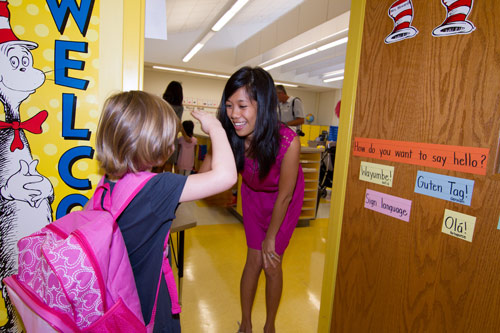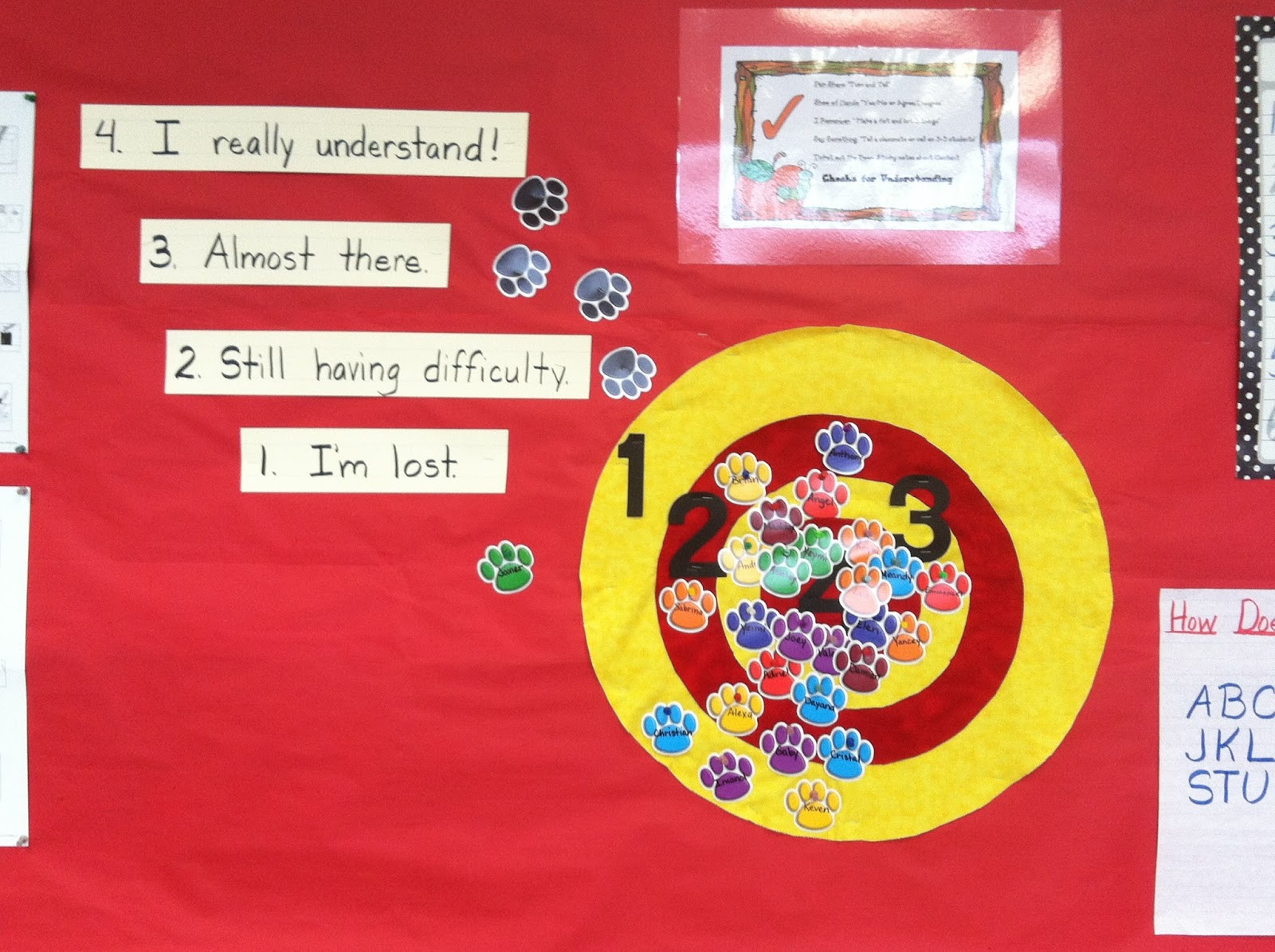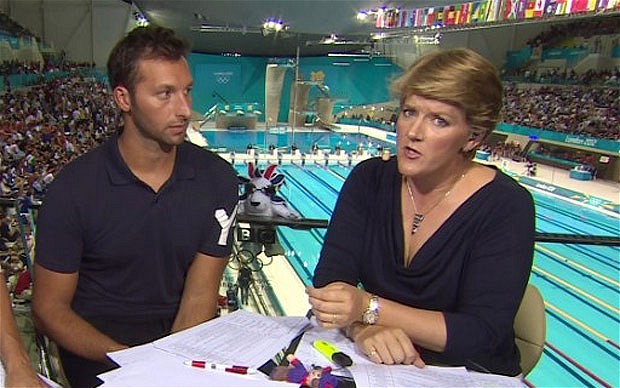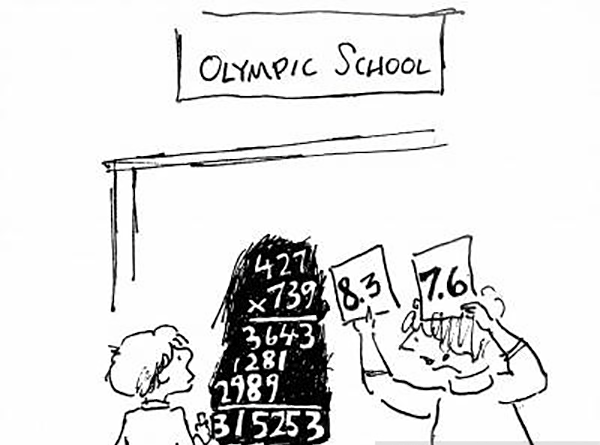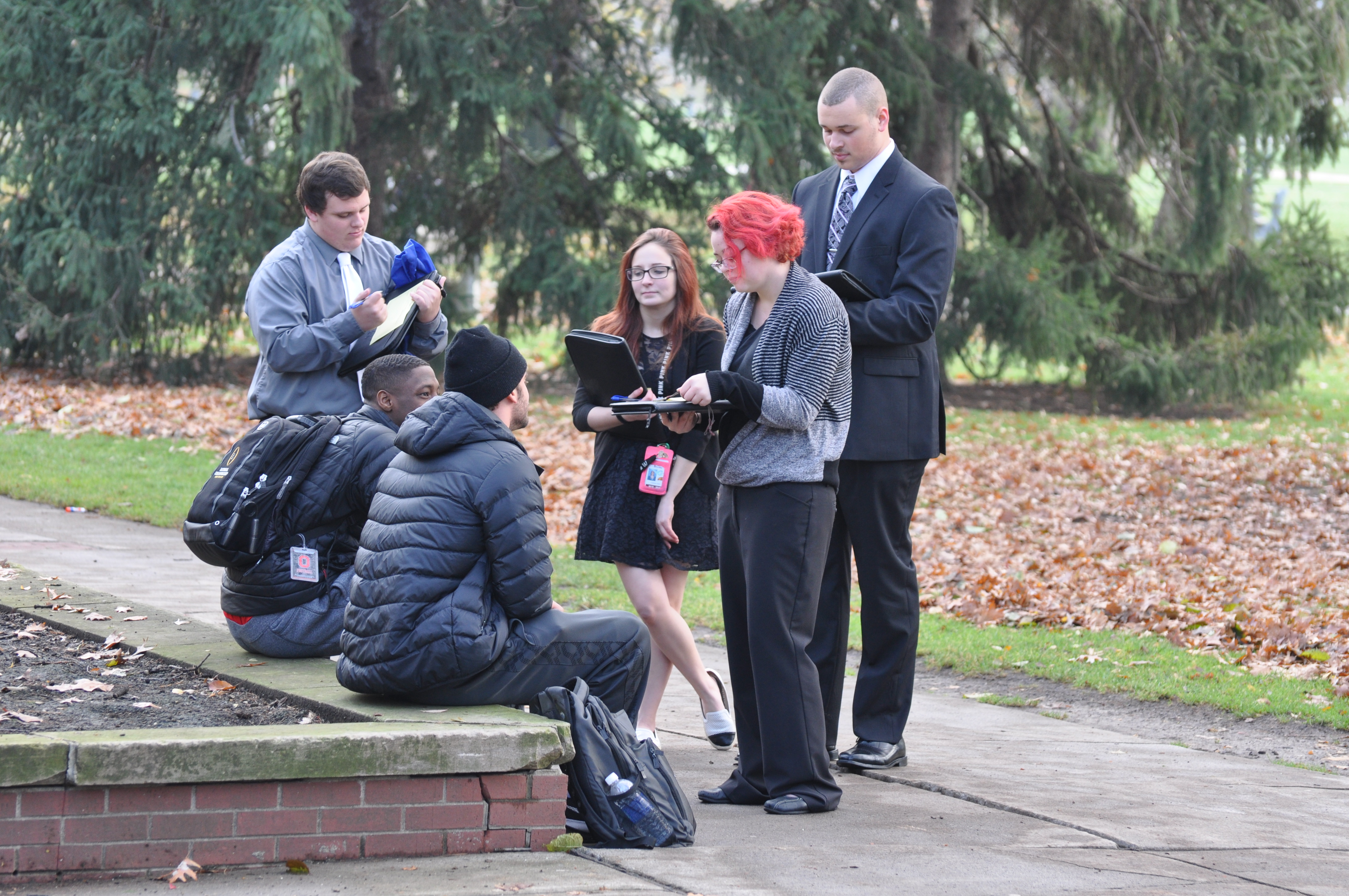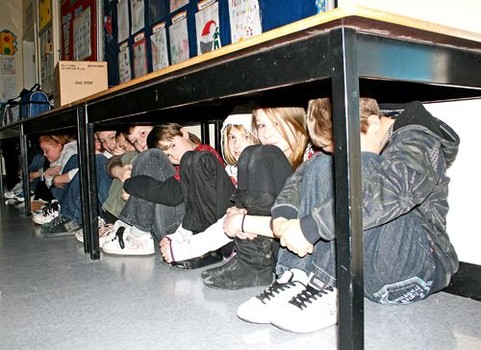A Teacher's Open Letter to Ohio's New State Superintendent
Dear Mr. DeMaria,
In your summer email to Ohio’s teachers, you noted that you find this to be an exciting time for public education in Ohio. “Exciting” is not the word I would use. “Frustrating” comes to mind as a better description of our current situation. You kindly asked for input, sir, and I feel compelled to give it.
Earlier this summer I reunited with a friend from my first year of teaching. We had lost touch and hadn’t seen each other in twenty years. She asked me, “How’s teaching? Besides the state stuff.” Trust me, when a teacher says “state stuff” to another teacher, we all know what that phrase means. It might be helpful for you to understand it as well, given your new position as State Superintendent of Public Instruction.
In the last several years, the State has issued more mandates to public schools in Ohio, including an extremely time-intensive Resident Educator requirement for the first three years of a career, mandatory evaluations of all teachers, SLOs, PGPs, new state tests, and more. If we could let something else go, that might not be so bad. But we still have to do the most important parts of our job: planning engaging and meaningful lessons, collaborating with colleagues, getting to know our students, assessing student work, contacting parents, and attending staff meetings and professional development workshops. Many of us also advise extra-curricular clubs or coach sports. We tutor after school, we attend our students’ games and recitals, we lie in bed at night reworking a lesson in our heads or agonizing over how we can help our students who don’t have enough to eat or who have no support system at home. The job has never been easy and it has always been exhausting, but never more so than now.
We’re tired, Mr. DeMaria. We are tired of having to prepare for high-stakes tests when we all know that tests do not represent the whole picture of what a child knows or how far he has come in his time with us. We are tired of being individually judged as teachers based on those test scores, when there is a surfeit of factors that impact how a student performs on a test, many of which are out of our control.
We are frustrated by the way the state tests are seemingly designed to hurt our District Report Card. If a student receives a score deemed Proficient, the multiplier we get for that student is 1.0. If a student scores one level higher, the multiplier is 1.1. An Advanced score earns us 1.2. But if a student scores one level below Proficient, the multiplier is .6. Did you expect it to be .9? Most logical people would. But that is not how it works. If a student falls two categories below Proficient, the multiplier is a .3. In essence, we are being penalized more for low scores than we are rewarded for good scores. I would love to hear the justification for this. The general public, of course, will most likely not know about this nonsensical math formula. We will just look like we are failing our students.
Public perception matters, Mr. DeMaria, because even though it has been twenty years, the state legislature has failed to fix an unconstitutional school funding system and consequently, we must rely on our communities to pass levies. That’s not likely to happen when the Report Card indicates that we are not effectively teaching our kids. And because Ohio’s schools are funded primarily based on property taxes, students living in areas of poverty have fewer opportunities because there is less money available to the district. We are tired of working under an unconstitutional funding system which penalizes districts for having families who struggle financially, because financial struggles often lead to educational struggles.
Furthermore, the constant barrage of news about Ohio’s charter schools is frustrating. We know they are not as effective as public schools in educating kids and yet they receive an inordinate amount of money to do so. 37% of Ohio’s charter schools which received federal funding in the last ten years were among the worst performing schools, or never even opened.[1] $30 million dollars went to these charter schools instead of public schools, charter schools that are not providing an effective or even adequate education, and some that never served even one student. By and large, charter schools are not doing an effective job of educating Ohio’s students, yet they continue to cost taxpayers and school districts millions of dollars. It is offensive.
We are tired of scandals among people who are supposed to advocate for Ohio’s kids and schools: ODE officials altering data to make charter schools seem more successful and state superintendents creating secret plans to put a CEO in charge of a struggling school district. We don’t want to feel that it’s “us vs. them” when it comes to ODE or the state school board. We want to feel that we are partners with these entities in providing the best education to Ohio’s students. We want to feel supported and appreciated, and frankly, we do not. Our trust has been violated.
We are frustrated when we are painted as union bullies who just want more money for ourselves. Collective bargaining is a keystone of our association and when we negotiate a contract, we are advocating for our students’ needs just as much, if not more so, than our own.
We are tired of defending ourselves and our profession. When Donald Trump Jr. completely disrespected and denigrated public school teachers in his speech at the RNC, OEA President Becky Higgins addressed Ohio’s teachers on her Facebook page. She reminded us that what we do for Ohio’s students matters, she expressed her gratitude for us, and she encouraged us to guard against letting Trump’s words make us doubt ourselves. This is what a leader does, and this is what you should be willing to do as Ohio’s State Superintendent of Public Instruction. Defend us, advocate for us, encourage us, lead us.
We are tired of being held responsible for any failure of Ohio’s education system. It is demoralizing and demeaning. We don’t control curriculum, standards, or resources, all of which can change from one year to the next, but we do an outstanding job with what we are given. Frankly, I think Ohio’s public school teachers are the only reason the system hasn’t completely collapsed.
I’m sure that the feeling of excitement you expressed in your email is due to your new position. It’s a new challenge; that can be invigorating. And we are on your side. We want to be partners with you. But there has been much damage done to the relationship between the teachers in this state and the educational leaders. We hope that you will be able to rebuild that relationship and be a true partner for us in our efforts to give Ohio’s children the very best education possible. We are already doing a phenomenal job in this endeavor; it would be nice to see the frustration we feel fade and the excitement you feel become contagious. I extend an open invitation to you to visit my classroom whenever you like; spending time with the kids and teachers of Ohio can only make you more successful in your new job.
With best wishes,
Julie Rine
Teacher, Minerva Local Education Association
[1] “News: Ohio Wasted Millions in Federal Funding on Charters that …” 2016. 29 Jun. 2016 <https://dianeravitch.net/2016/05/26/news-ohio-wasted-millions-in-federal-funding-on-charters-that-never-opened-and-on-very-low-performing-charters/>
Save
Save
Save
Save
Save
Save
The 8 Olympic Events of Teaching
Clearing the Hurdles
By Julie Rine, Minerva Local Education Association
 The Olympics are here, and in a time of political divisiveness, we can finally unite with a common desire that our athletes’ long practices and hard work will lead to a victory for Team America.
The Olympics are here, and in a time of political divisiveness, we can finally unite with a common desire that our athletes’ long practices and hard work will lead to a victory for Team America.
Within weeks, our version of the Olympic games begins: the 2016-2017 school year. The events are numerous and varied, and after a well-deserved break, it’s time to get back in shape for our Games.
1. Starter Gun Shot
For me, one of the greatest moments of the last day of school is turning off the 5:30 AM daily wake up call on my phone. Now it’s time to turn it back on and train myself to jump eagerly out of bed when it first goes off so I can be ready for our Opening Ceremony (Teacher Convocation Day).I can usually do that successfully until November, and then it becomes the starter gun snooze.
2. Synchronized September
If I could fast forward to the end of September, I would. The beginning of the year is fraught with stops and starts, with new students coming and other kids switching class periods, with class meetings and assemblies, but by the end of September, my classes and I are in sync. They know the rules and expectations, I know their names and strengths, and we are enjoying the rhythm of routine. The repetition and practice to get there can be painful, but the results are worth it.
3. Target Practice
Having a target is crucial to meeting with success. When I first started teaching, I would teach a unit and then write a test based on what we had studied. Now, I decide what I want my students to know and plan lessons to fit that goal. I also share with my students what the target is, because it’s important for them to know how close they are to reaching the goal. I still tweak final assessments to reflect what we may have focused on in class, but having a clear target makes planning and learning more effective.
4. Commentator Chit Chat
When an Olympic commentator notes, “I think he will be disappointed with that performance” or “She still has the team event coming up”, we all know what that means: “That performance was an epic disaster.” As a teacher, we have to learn how to properly phrase what we say, too. Calmly saying “I think one more attempt at revising this essay would make it really strong” rather than “Are you kidding me? You changed one word and called that a revision?” is a much more productive way to start a conversation with a student about reworking an essay. When parents request a phone call every time their child doesn’t turn in an assignment, pointing out how great it is that they can now check their child’s grades online at any time is much better than saying “Do you seriously think I have time to do that for every student I teach?” It’s not that there isn’t a place for blunt honesty, saying what you’re thinking in a kinder way that is much more likely to produce positive results.
5. Classroom Gymnastics
Olympic Gymnastics are a combination of precision and artistry. Some events require incredibly tight maneuvers; one wrong move and the vault or the flip or the jump can end disastrously. On the other hand, the best routines, while technically flawless, are also highly artistic and emotionally rich. The best teachers know that lesson plan delivery requires both science and art. The plotting of which methods to use is essential; not every technique works for every content area or activity. However, even the best technical plans need finesse, a tuned-in element to the kids in the room, a feeling for when to push a discussion and when to back off, when to veer slightly off track and when to stick to the plan. The science of teaching can be learned, but the art of teaching comes from experience, and in some cases, from natural ability.
6. Real-life Relay
No one teacher can do it all. In fact, it takes more than teachers to make a truly effective school community, one in which every student is encouraged, supported, protected, and loved. In the course of a day, our students pass from bus drivers to playground monitors to cooks to custodians, and in their lap of the school, they see teachers, aides, and principals, too. We are all on the same team and every one of us is necessary in order for our students to have a fulfilling and rewarding educational experience.
7. The Modern Day Educational Pentathlon
The modern pentathlon with its current events was first introduced at the 1912 Stockholm Games by Baron de Coubertin, who believed that the various events would test “a man’s moral qualities as much as his physical resources and skills, producing thereby a complete athlete.” Our state tests represent (or are supposed to) a wide variety of skills that produce a complete student, a student who is capable of reading, writing, analyzing, problem-solving, and critical thinking. But can you truly measure a complete student with a test? Doing well on a standardized test does not necessarily mean a child is “college and career ready”. Yet the tests remain the ultimate contest for our students, and the stakes are high.
8. The Judge’s Scores
All of the hard work, long practices, and years of competition experience combine to get an Olympian athlete ready for the main event every four years. In education, even the days when no other adult steps foot in your classroom prepare you for the day when an evaluator arrives. Most of us realize that our teaching ability is not truly reflected in a one-day observation; ineffective teachers cannot skate by on a few formal evaluations in which they pull out all the stops, nor will highly effective teachers lose their jobs based on an evaluation of a class in which everything that could go wrong, did. Still, a positive evaluation which reinforces that we are doing an effective job is rejuvenating. And, unlike the Olympics when the judge’s score is the final evaluation, the educational “judge” can (and should) also be a coach, giving meaningful feedback to the teacher. Gaining true guidance in how to improve our practice is invaluable.
Most people can swim or run or do a cartwheel, but an Olympic athlete takes those common activities to new levels of spectacular. Most people can read or write or solve an equation, but a gold-medal caliber teacher can help students achieve new academic and personal heights in these and other areas. We are educational Olympians, and our team is called on to demonstrate precision, artistry, endurance, resilience, and flexibility in our performances every day. As the new year begins, remember that you have trained for this. You are ready! And when the year is completed, or maybe after a particularly challenging school day has come to an end, close your eyes and imagine a Gold Medal hanging around your neck, an audience exuberantly applauding for you, and your school fight song blaring through the speakers. While teachers typically don’t get this kind of public accolade for their performances, we are just as deserving of high praise as are the Olympic athletes.
Save
Save
Save
Save
Save
Save
Save
Freedom to teach
 John Wilson
John Wilson
Teacher
Greene County Career Center
About five years ago, the superintendent approached me about starting a program to help students to be prepared for the diverse workforce of the 21st century. So I created a class called the Global Leadership Project. It allows students to examine how Fortune 500 companies in Ohio use diversity to outperform their competitors. My approach, as a lifelong educator, is to create and deliver lessons based on real-life experiences that can change lives.
For example, in Dayton, the city has a “Welcome Dayton Program” that helps new immigrants assimilate to the community. City services have also been adapted to meet the needs of different cultures. My students have also participated in an improvisational workshop at the Blackbox Theater in Dayton where they learned one of the most important lessons in intercultural communication. It’s an exercise called “Yes/And rather than No/But”:
The lesson is that if you use the phrase “yes…and…” in talking with someone, you have a better chance to move the conversation forward. Saying “no…but…” puts the brakes on a conversation.
After students have heard from a guest speaker, we make a “thank you” video to send to them. It is a great opportunity for students to see themselves on camera and to become aware of their own self-expressions. I show them how they are responsible for the stories they put out there in the world about people different from themselves, and that they in turn have power to influence the stories told about them.
In a visit to the archives at P&G in Cincinnati, we see the products the company has produced and how it does its branding of such well-done items as Ivory Soap. Students select a P&G product and research its branding campaign. We go to a grocery store, find the products and students reflect on how they are like a particular product. It can be quite stretch when you have only 30 minutes to complete the activity. Then we tape a special “thank you” video in the store to send to P&G.
It’s a great opportunity for students to take what they have learned and apply the lessons to their own lives. They understand how to shape and maintain their own personal brand on social media.
These are life skills that can’t be measured by a standardized test. I think the class demonstrates the good we can do as educators when we are given the freedom to teach.
Share your story! How do you make a difference in the lives of your students? Go to saveohioschools.org.
Save
Save
Save
Save
Save
Save
Save
Save
Save
Lockdown for safety
By Julie Rine, Minerva Local Education Association
 “This would be the perfect day for a school shooting.”
“This would be the perfect day for a school shooting.”
My colleague whispered those words to me during AIR testing week, and followed it up with the equally chilling statement, “I have that thought sometimes. I hate it.”
She felt that way because we were all out of our routine in classrooms that were not our own, monitoring tests with kids who were not our own students. If anyone had really had the evil inclination to inflict violence upon those at our school, the controlled chaos already in place due to testing could have made us an easier target. When I started teaching, these thoughts would have seemed ludicrous.
I was 26 years old when I went home after school on a sunny April day in 1999 and turned on the TV to see students running from Columbine High School. Their arms were raised; their faces were showing the effects of seeing a familiar place of safety and comfort become a place of horror and fear. This was before I was a parent myself, so it was strictly as a teacher that I tried to put myself in that situation. The thought of hearing gunshots in my school or witnessing one of my own students use a gun against me or his peers was unimaginable.
Schools changed forever after that day. Lockdown drills have become just as common as fire drills. And they’ve evolved; we’ve adjusted our plans after every new school shooting and tried to imagine every possible scenario. Our classrooms now have medical supplies, “just in case”. We teach our kids to ignore the fire alarm unless they’ve been told to leave, because it could be a ruse to get them to run out of the building and into the path of the evil that wants to hurt them. We’ve practiced making an all-call announcement from our cell phones to alert the school of an active shooter, and we have shut down stairways or hallways during drills to force kids to think on their feet and escape by a different route.
We’ve gone from locking the door and sitting in silence against the wall, to fighting back and/or running, to barricading the door and arming ourselves with wasp spray, heavy textbooks, and scissors. During the first week of school, high school teachers ask kids to identify potential weapons in the classroom that could be used to defend ourselves in the worst case scenario. Elementary teachers have been trained in how to get little boys and girls to be quiet while they are hiding in cubbies or closets. Universities have an “emergency lock down” key hanging on classroom walls. We’ve gone from a “this will probably never happen but just in case” mentality to “we have to be prepared because this is much more likely to happen than we ever thought”.
I’m a parent now, and I’m grateful that my school district takes the threat of violence within our schools seriously. I’ve talked to my 7th grade daughter about how to decide if she should run, hide, or fight, and that conversation is not one I could ever have anticipated back in 1999. This summer, a photo went viral of a 3-year old girl standing on a toilet. Her mom took the picture thinking her daughter was being mischievous, but when she asked her what she was doing, the little girl in the pink and yellow nightgown told her mom she was practicing a lockdown. My 12-year old daughter and this little 3-year old girl are growing up in a world where preparing for this kind of violence is matter-of-fact, just part of their reality.
I have a few opinions about some changes that could be made in how we regulate guns in this country, but for every idea or proposal there is a counterargument. Some of my best friends and family members are very “pro-gun” and they make logical arguments to me when we discuss this issue. People who own and love guns are not inherently “bad’, and neither are people who desire stricter gun laws.
Still, something must be done beyond repeatedly adapting lockdown drills. Twenty innocent children and six adults died in the Sandy Hook shooting in 2012, yet nothing has really changed since then. Some argue that our country is simply “too far gone” to make adjustments in how we buy, sell, or regulate guns; some contend it would take too long to affect real change.
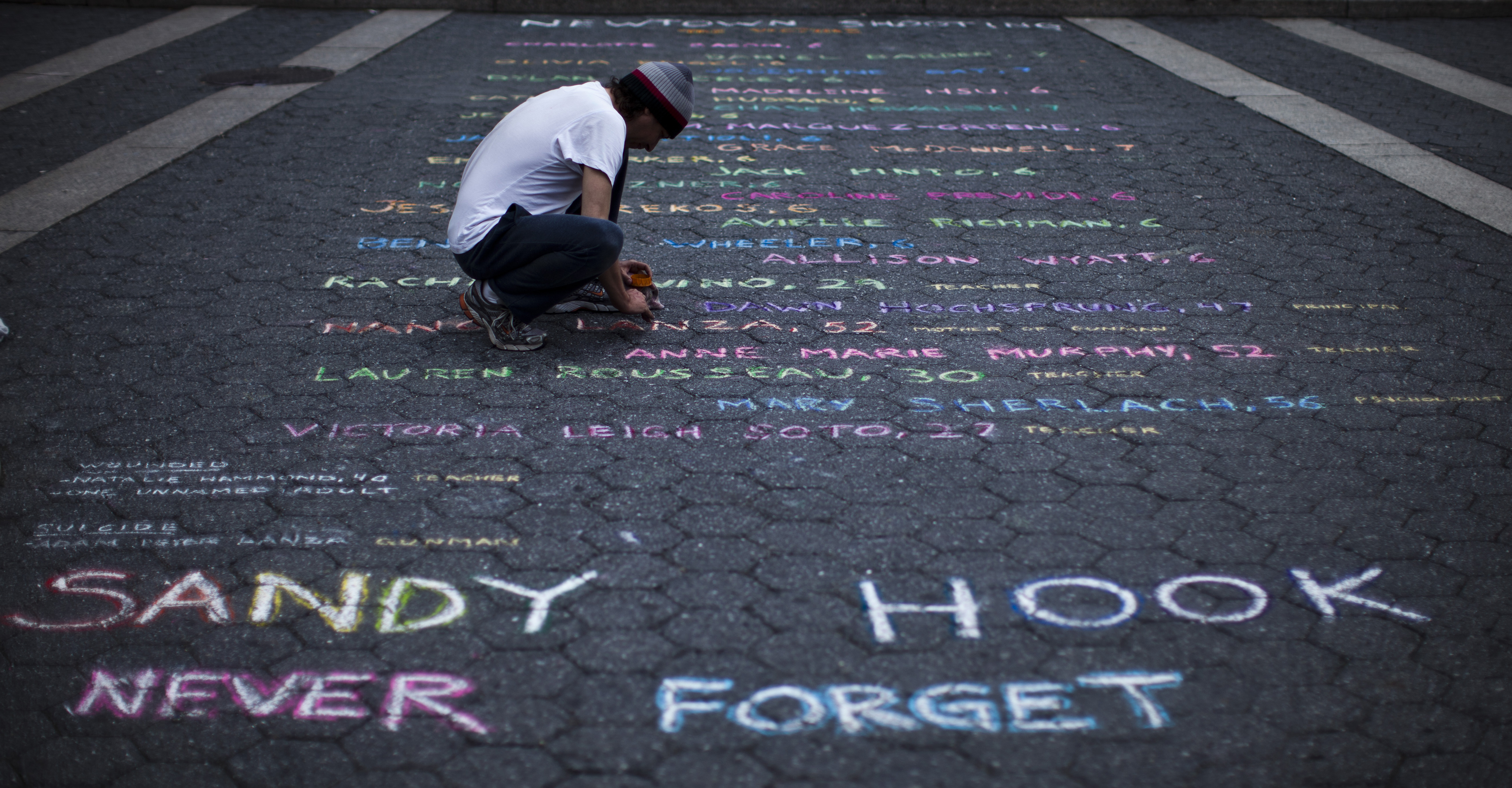
I don’t buy it. Our society can change because our society has changed. Twenty years ago, if I had told my students we were going to do a lockdown drill, they wouldn’t have known what I meant. Twenty years ago, the word “Columbine” wasn’t known to many people outside of Colorado, and if it was, it was known as a flower. Twenty years ago, my friend wouldn’t have shivered as she looked around and told me that it would be a good day for a school shooting.
We are raising a generation of kids who are well-aware of the dangers they face at school and outside of school. These kids don’t even walk around in fear the way we adults might; to them, gun violence is so commonplace, it has become normal. They know they can be shot in a movie theater or at a dance club or in their own school. We have come to expect what we wish we could avoid, while our leaders avoid what we wish we could expect: change. My truest desire is that our country will find some middle ground, some compromises, some way to keep the 2nd Amendment intact while making our country and our schools safer for our children.
When I retire in another 20 years, we might still have lockdown drills, but wouldn’t it be nice if they were as obsolete as WWII duck and cover drills are today? At the end of my career, I would like to leave a note to the teacher who takes my place telling her about all of the great people she will encounter in my school, instead of a note telling her where the weapons and medical supplies are stashed.
Is that too much to ask?
Save
Save
Save
Save
Save
Save
Save
Save
Top 12 Things for Teachers to Do This Summer
By Julie Rine, Minerva Local Education Association
The 4th of July is over; are you feeling the hot whips of panic? The 4th of July is a day to celebrate America’s independence, but teachers know it as “the beginning of the end” of our independence. The worst feeling is going to back school feeling as if you’ve not fully taken advantage of the summer.
We teachers hate it when people outside of education say “It must be nice to have your whole summer off”, but let’s be frank; even though we have less time than the general public thinks we have and we spend much of that time engaged in school work of some sort, we do have more freedom than the average person has during the summer. Each summer seems to fly by faster than the last, but take heart. If you feel like your summer is slipping away, it’s not too late to have some fun and get some tasks accomplished. Here are a few suggestions for making your summer full and productive, so you can feel refreshed and ready to tackle the new school year knowing you had a truly good summer.
#12. Go to a concert, preferably an outdoors one.
Many musicians tour during the summer months, and you have the luxury of going on a weeknight without worrying about getting up early for work in the morning! Whether you relive your youth with an older group or check out a new act or even a symphony orchestra, make music a part of your summer.
#11. Read a book recommended by a friend.
Pick a book that you wouldn’t choose for yourself. Being an English teacher, I always have a LONG list of books I want to read over the summer, but some of the best ones I’ve read are ones I would never have selected on my own. And even if you don’t end up loving the book, it might help you empathize with your students. At some point we will ask them to do or read something that wouldn’t be their first choice; let’s remind ourselves what that’s like. (And if you find yourself in Columbus at all this summer and you haven’t yet discovered The Book Loft in German Village, set aside a few hours and explore this incredibly awesome bookstore. It’s 32 rooms of books!).
#10. Clean out a drawer or closet.
If you get your junk drawer or silverware drawer organized and clean, every time you open it you will be reminded that you did SOMETHING this summer besides binge on Netflix. If you get truly motivated, clean out a closet. Starting the school year with a closet that holds only clothes you truly wear, and not clothes that live in the “I Have a Dream” section (clothes that I might fit into again someday!), or the “I know I’ll find an occasion to wear this” section, will make going back to school much simpler and easier.
#9. Take a trip to a museum that you’ve never visited.
One of the places on my list to see this summer is the Troll Hole Museum in Alliance, Ohio, just 25 minutes from my house. I didn’t even know this place existed until I saw an article on Facebook. This quirky museum apparently holds the Guinness World Record for the largest troll collection. Now I don’t have a special affinity for troll dolls, but this just seems like something I need to see for myself. One of my favorite museums is the James Thurber House in Columbus. If you haven’t been to the Rock and Roll Hall of Fame in Cleveland, you’re really missing out. Ohio is also home to the Pro Football Hall of Fame, of course, as well as five different presidents’ homes/museums and the National First Ladies Historical Site. There are science museums in Cleveland, Dayton, Columbus, and Cincinnati. Chances are there is at least one museum within a few hours of your home that would interest you. Take a day to check one out.
#8. Buy a Christmas present.
I know some of you super organized shoppers are saying, “Just one?” Hey, if you’re organized enough to get all of your Christmas shopping done during your time off, more power to you! But even if you just buy one present, in September you’ll be able to say, “I’ve started my Christmas shopping”. Trust me, it’s a good feeling.
#7. Try a new activity with your kids.
My daughter and I went geocaching for the first time this summer. We love it! It gets us out of the house and gives us a chance to spend time together using a screen for something other than TV and games. A friend of mine and her kids choose something to rank every summer, like “best places to have a picnic”, or “best parks”. They choose factors to analyze, make visits to several local vacations over the course of the summer, and then report the results on Facebook. Relatively cheap and easy family fun.
#6. Spend a day doing professional development.
Even if you’re in a situation where professional development is not a necessity to renew your license or get a higher degree, spending at least a day or two learning new methods or content can really be really energizing. Without the pressure of papers to grade, lessons to plan, parents to call and other tasks we must do during the school year, your brain is free to really soak in the new material. I find myself much more able to focus on new ideas and resources when I am not distracted by the long to-do list on my desk.
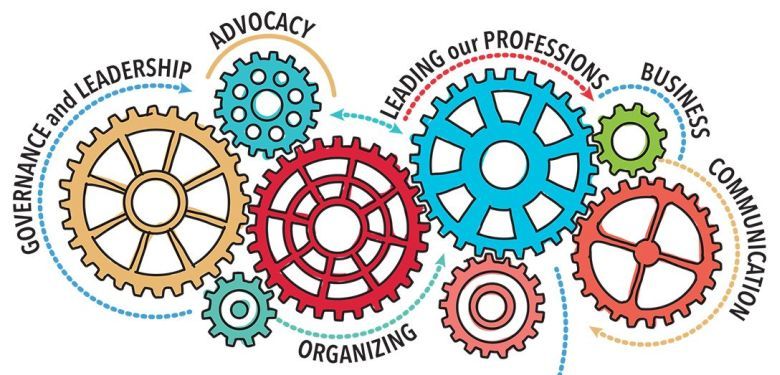
#5. Cook some new recipes.
Since you have the luxury of extra time, you could try cooking a truly elaborate, multi-step gourmet meal. I like to try a few recipes that are fast and easy to throw together, so I have some new meals to add to the mix once the craziness of school starts and time becomes a hot commodity. Along those same lines, we like to try a new pizza place during the summer. Because there are a lot of them, and, you know, PIZZA. Can’t go wrong there.
#4. Go see a movie!
There is simply nothing better on a hot, humid summer day than seeing a movie on the big screen. Once school starts, I rarely have time to see a movie in the theater, but during the summer, I can see new-releases the day they come out. Take advantage of being able to see the matinees, which have fewer people and cheaper ticket prices.
#3. Write or find a new lesson or unit plan.
Teachers at the beginning of their careers or with new preps will probably have to spend a lot of time doing this out of necessity, but if you’re a veteran teacher, it’s easy to fall into a rut and teach the same content in the same way. I have found that taking the time during the summer to figure out a new way to present even one lesson helps me go back to school with a little more anticipation and excitement. There are tons of good websites with free lesson plans and resources for teachers, and I never have time to check them out once school starts. Some sites allow teachers to sell original lesson plans, so if you write your own new lesson plan, take the time to upload it and make a few dollars while you’re at it.
#2. Get your hands on some fair food.
In our house, it’s not summer until we’ve had fair fries and lemonade at the local homecoming. This is a small town affair; if you are so inclined, get your goodies at your county fair or even the state fair. But by all means, get some of that fresh lemonade and French waffles or fries. It’s pretty mandatory in the list of summer activities. You don’t even have to go on rides or walk through the buildings; there’s no shame in popping in just to get the fair food fix.
Above all, if you do nothing else,
 #1. Spend an entire day in your pajamas.
#1. Spend an entire day in your pajamas.
Watch Netflix or read a book for fun. (Rainy days are especially great for this). If you do this every day, you might feel as if you have wasted your summer. But hey, it IS summer, and you worked overtime for nine months. So once in awhile, get your favorite junk food and find your comfiest chair or sofa and settle in for a day of mindless entertainment. You deserve it. In fact, the ladies of Litchfield are waiting for me to check in with them now.
I’m sure you have your own must-do list for a truly good summer. What activities make your summer successful?
Save
Save
Save
Save
Save
Save
Why a Nameless Woman Just Became Part of My Curriculum
 By Julie Rine, Minerva Local Education Association
By Julie Rine, Minerva Local Education Association
When I first read the Stanford rape victim’s letter[1] to her rapist, Brock Turner, I considered using it in my classes next year. It is a testament to the power of good writing, to the importance of knowing how to be articulate and eloquent even when writing about an emotional issue.
Then I read more about Brock Turner’s shamefully light sentence of six months in a county jail. I read his father’s letter requesting leniency from the judge, citing the fact that Brock’s life “will now never be the one he dreamed about.”[2] I read the statement of support from his childhood friend, Leslie Rasmussen, who argued Brock isn’t really a rapist: “This is completely different from a woman getting kidnapped and raped as she is walking to her car in a parking lot. That is a rapist. These are not rapists. These are idiot boys and girls having too much to drink and not being aware of their surroundings and having clouded judgment.”[3] I got more and more livid. I’m no longer considering teaching this case to my students next year.
I am doing it. Because I don’t want any of them to be that woefully ignorant. I don’t want any of them to become a Brock or a victim to a Brock.
Leslie Rasmussen has since apologized, saying that she did not strongly enough acknowledge the severity of her friend’s actions. She added, “I fully understand the outrage over Brock’s sentencing and my statement. I can only say that I am committed to learning from this mistake.”[4]
I don’t want my students to learn from their mistakes when it comes to rape.
 I don’t want my students to think it is okay to blame alcohol for their own heinous actions. I don’t want my students to think they are entitled to take advantage of someone else sexually just because she had too much to drink. I don’t want my students to think that their money or athletic prowess or race gives them the right to take what they want, when they want it. I don’t want my students to think that just because a girl can’t say “no”, it means she is saying “yes”. I don’t want them to think that what a girl wears, where she goes, when she goes, or what she does when she gets there takes the place of consent in any way. I don’t want my students to think that rape doesn’t count if the victim can’t remember it or isn’t conscious during it. I don’t want my students to ever have to sit on the prosecution’s or the defense’s side at a rape trial. I don’t want to see any of my students’ photos, be it polished and professional or a mugshot, being shared over and over on social media in connection with a rape case. I don’t want any one of my students to wake up in a hospital, only to have to learn the facts of how she had been violated and assaulted, and to have to endure, as Turner’s victim describes, “multiple swabs inserted into…vagina and anus, needles for shots, pills… a Nikon pointed right into… spread legs”.[5] I don’t want my students to ever be on the receiving end of an open letter written by the Vice President of the United States that says, “I am filled with furious anger — both that this happened to you and that our culture is still so broken that you were ever put in the position of defending your own worth.”[6]
I don’t want my students to think it is okay to blame alcohol for their own heinous actions. I don’t want my students to think they are entitled to take advantage of someone else sexually just because she had too much to drink. I don’t want my students to think that their money or athletic prowess or race gives them the right to take what they want, when they want it. I don’t want my students to think that just because a girl can’t say “no”, it means she is saying “yes”. I don’t want them to think that what a girl wears, where she goes, when she goes, or what she does when she gets there takes the place of consent in any way. I don’t want my students to think that rape doesn’t count if the victim can’t remember it or isn’t conscious during it. I don’t want my students to ever have to sit on the prosecution’s or the defense’s side at a rape trial. I don’t want to see any of my students’ photos, be it polished and professional or a mugshot, being shared over and over on social media in connection with a rape case. I don’t want any one of my students to wake up in a hospital, only to have to learn the facts of how she had been violated and assaulted, and to have to endure, as Turner’s victim describes, “multiple swabs inserted into…vagina and anus, needles for shots, pills… a Nikon pointed right into… spread legs”.[5] I don’t want my students to ever be on the receiving end of an open letter written by the Vice President of the United States that says, “I am filled with furious anger — both that this happened to you and that our culture is still so broken that you were ever put in the position of defending your own worth.”[6]
I don’t want my students to use the writing skills I teach them to write a rape victim statement that goes viral because of its power and poignancy.
Somewhere in Ohio, there are teachers who taught Brock Turner just a few years ago, who looked out at his face every day, who graded his papers, who probably asked him to put his phone away during class, and who wrote college recommendation letters for him. I am sure that those teachers are having a myriad of mixed emotions right now. When I try to picture any one of the goofy teen boys I teach as a rapist, it seems inconceivable. I’m sure it seemed inconceivable to Brock’s teachers, when they heard that one of their students — one of whom they were probably proud for his academic and athletic success — was the perpetrator of a violent rape. When I imagine one of the young girls I teach being a rape victim, it physically turns my stomach. I want to spare them from that, but not by telling them not to drink around guys, not to wear short skirts, or not to flirt at a party. None of those things is illegal; rape is. Rape is illegal, and that is why we must start by eradicating the actions of the perpetrators instead of dictating the actions of women.
I don’t know if talking about it in my classroom will help. But I can’t imagine it would hurt. The Common Core curriculum wants more nonfiction in the classroom? Fine. My students are going to read about this case, about what Turner did to that young girl, about the heroes who caught and stopped him, about the pitiful sentence Turner received, and about the country’s outraged reaction to it. They are going to read his dad’s letter, his childhood friend’s letter, and his victim’s letter. They are going to read Vice President Joe Biden’s letter. We are going to talk about all of the reasons why people might blame the victim, and all of the reasons why that is utter tripe and must be stopped. I am going to have the boys in my classes literally look at the girls in the room and ask themselves how they would react if they saw Brock Turner doing to any one of these girls what he did to his victim. The name of the victim in the Stanford case has not been made public, but I am going to make the young men in my class give her a face: the face of a girl they have known since kindergarten, the face of a girl they secretly have a crush on, the face of a girl they may only know from sitting next to her in my English class. We are going to talk about the importance of looking out for one another, of spotting dangerous behavior before it gets to a point of no return and, if necessary, of stopping the attack whether the victim OR the perpetrator is a friend or a stranger.
Joe Biden notes that the victim’s letter should be “required reading for men and women of all ages.”[7] So it won’t be easy, and it won’t be comfortable, but this case will now be part of my curriculum. Many times when it comes to rape, and particularly in Brock Turner’s case, the judicial system has failed. I’m going to do my part to make sure the educational system does not.
[1] “Here’s The Powerful Letter The Stanford Victim Read To Her Attacker …” 10 Jun. 2016 <https://www.buzzfeed.com/katiejmbaker/heres-the-powerful-letter-the-stanford-victim-read-to-her-ra>
[2] “‘A steep price to pay for 20 minutes of action’: Dad defends Stanford …” 2016. 10 Jun. 2016 <https://www.washingtonpost.com/news/morning-mix/wp/2016/06/06/a-steep-price-to-pay-for-20-minutes-of-action-dad-defends-stanford-sex-offender/>
[3] “Brock Turner’s Friend Pens Letter of Support — The Cut.” 2016. 10 Jun. 2016 <http://nymag.com/thecut/2016/06/brock-turners-friend-pens-letter-of-support.html>
[4] “Musician who defended Brock Turner feels backlash.” 2016. 10 Jun. 2016 <http://www.cnn.com/2016/06/08/us/stanford-rapist-defender-backlash/>
[5] “Here’s The Powerful Letter The Stanford Victim Read To Her Attacker …” 10 Jun. 2016 <https://www.buzzfeed.com/katiejmbaker/heres-the-powerful-letter-the-stanford-victim-read-to-her-ra>
[6] “Read Joe Biden’s Open Letter to the Stanford Survivor of Sexual Assault.” 2016. 10 Jun. 2016 <http://www.motherjones.com/media/2016/06/read-joe-bidens-open-letter-stanford-suvivor-sexual-assault>
[7] “Read Joe Biden’s Open Letter to the Stanford Survivor of Sexual …” 2016. 10 Jun. 2016 <http://www.motherjones.com/media/2016/06/read-joe-bidens-open-letter-stanford-suvivor-sexual-assault>
Save
Save
Save
Save
Save
Save
An Educator’s Conundrum
By Maria Correale Mueller – AP U.S. Government Teacher, Mason City Schools
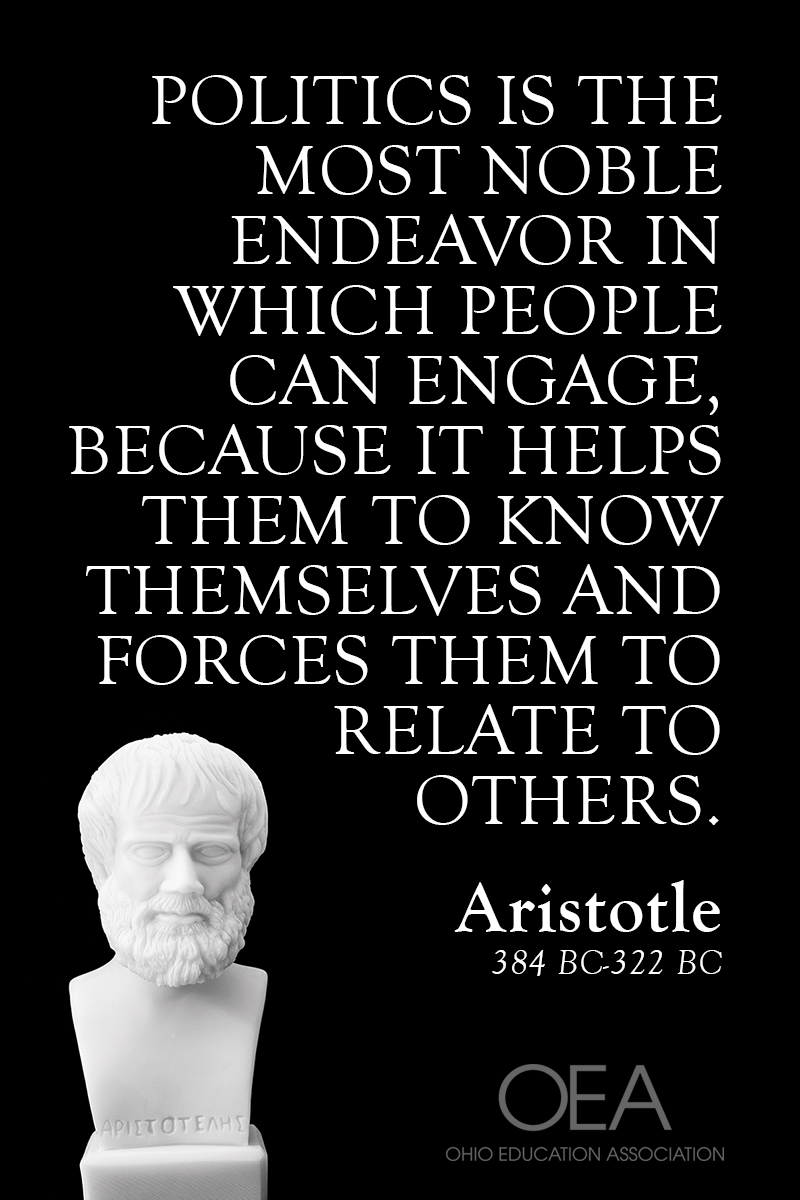 As an educator, I cherish the opportunities my students have to observe our Constitution at work, going beyond reading about it in a textbook. Watching the fulfillment of the checks and balances our Founding Fathers established is a powerful teachable moment. Although checks are routine in our governmental system; few examples are as vividly memorialized than the confirmation process of a Supreme Court Justice. I hope my students will soon have the opportunity to witness and appreciate our Senators fulfilling this constitutional responsibility.
As an educator, I cherish the opportunities my students have to observe our Constitution at work, going beyond reading about it in a textbook. Watching the fulfillment of the checks and balances our Founding Fathers established is a powerful teachable moment. Although checks are routine in our governmental system; few examples are as vividly memorialized than the confirmation process of a Supreme Court Justice. I hope my students will soon have the opportunity to witness and appreciate our Senators fulfilling this constitutional responsibility.
Our Founding Fathers valued great thinkers like Aristotle who believed, “Politics is the most noble endeavor in which people can engage, because it helps them to know themselves and forces them to relate to others.” Today, Aristotle’s view of politics may seem more like science fiction. In this time of political polarization, I fear my students are left only with the disheartening rhetoric of politicians uninterested in serving the people and unwilling to relate to others, particularly those whose views and backgrounds differ from their own.
Senator Portman, in his March 18 Enquirer Op Ed, said confirmation should wait until “after the people have spoken” in the upcoming presidential election, despite his own acknowledgement that the people have already spoken by electing the current President and Senate. He states waiting for a “less partisan” atmosphere “will give the nominee more legitimacy” and “better preserve the institutional credibility of the Senate and the court.” In fact, holding up the confirmation promulgates the hyper-partisan atmosphere, demonstrating for my students that politics is divisive, rather than spirited problem solving. To not hold a hearing, nor allow a floor vote isn’t the result of the checks and balances our Founding Fathers bestowed, but superficial partisan struggles superimposed on an otherwise stable government foundation.
Senator Portman advances it isn’t the Senate’s duty to give advice and consent, but an option, like deciding to have dessert after dinner. He suggests this is the industry standard regarding lame-duck lifetime appointments. Again, the lesson for students is problematic; in what profession is it appropriate to neglect clearly-defined job expectations?
 As an educator, herein lies a fundamental concern. People make political decisions based on their perceptions of truth. The more educators must admonish our students to discount what they hear from politicians regarding the Constitution, the less trust they have in the government where those politicians serve. What for modern political participants is simply business-as-usual blurring of the truth for momentary advantage is surely and relentlessly undermining students’ trust in our leaders and our young people’s hope for meaningful political discourse. We need more, not less, genuinely optimistic messages from our leaders to discuss with my students so they can see our Constitution alive and thriving.
As an educator, herein lies a fundamental concern. People make political decisions based on their perceptions of truth. The more educators must admonish our students to discount what they hear from politicians regarding the Constitution, the less trust they have in the government where those politicians serve. What for modern political participants is simply business-as-usual blurring of the truth for momentary advantage is surely and relentlessly undermining students’ trust in our leaders and our young people’s hope for meaningful political discourse. We need more, not less, genuinely optimistic messages from our leaders to discuss with my students so they can see our Constitution alive and thriving.
I implore Senator Portman to fulfill his duty as a public servant, to be that example for my students. If he continues his position of obstruction, he risks discrediting all of us who yearn to prepare students to become the next generation’s honorable leaders. He risks declaring what we have taught our children is untrue, he risks demonstrating that the Framers were not brilliant Fathers of the beautiful, democratic work-in-progress we call the United States, but that their words, while wonderful prose, are only to be considered secondary to the self-serving nature of modern partisan politics.
Save
The unfulfilled vision of Board v. Board of Education
By Julie Rine, Minerva Local Education Association
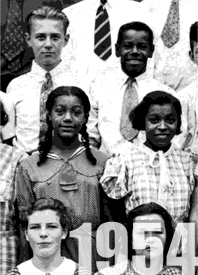 In 1954, the Supreme Court ruled in Brown v. Board of Education that “separate but equal” public schools for black and whites were not constitutional. Segregating kids based on race had long been the practice and it took the government stepping in to put a stop to it… in theory, at least. In reality, the ruling did not put an end to the matter. Years after the Brown ruling, both Presidents Eisenhower and Kennedy had to deploy federal troops to quash riots in Little Rock, Arkansas and at the University of Mississippi when black students tried to enroll.
In 1954, the Supreme Court ruled in Brown v. Board of Education that “separate but equal” public schools for black and whites were not constitutional. Segregating kids based on race had long been the practice and it took the government stepping in to put a stop to it… in theory, at least. In reality, the ruling did not put an end to the matter. Years after the Brown ruling, both Presidents Eisenhower and Kennedy had to deploy federal troops to quash riots in Little Rock, Arkansas and at the University of Mississippi when black students tried to enroll.
Desegregation was not an easy process, but data shows that at the height of integration in the late eighties, the achievement gap between black and white students was cut in half, primarily because black students, when attending schools with better resources and more experienced teachers, do better.[1][2] No surprise there. Integration works.
But it’s not happening much today.
Google “Brown v. Board of Education” and the results will give you several sites that describe the case in detail. But add the word “today” to that search, and you will find a myriad of articles explaining why, six decades later, American public schools are just as racially segregated as they were in 1954; in many cases, even more so.
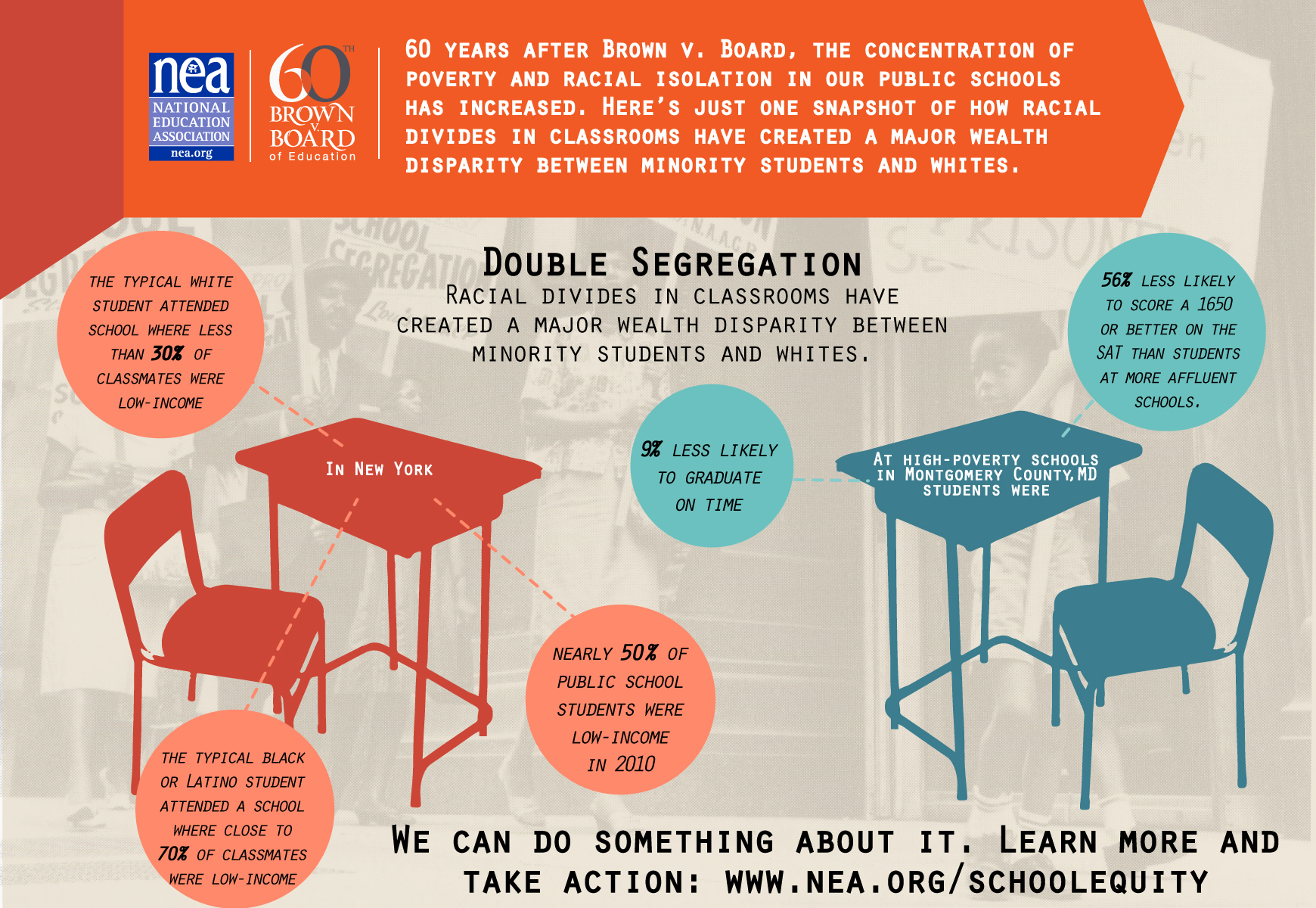
One reason is that economic segregation has grown, and there is an undeniable link between race and poverty. According to Communities in Schools President Dan Cardinali, the NEA reports that “Of all public school students today, nearly half are low-income and 44 percent are students of color, and both populations are concentrated in segregated schools. African-American and Latino children are 2 to 3 times more likely to be poor than white children.”[3] In Ohio, we continue to operate under an unconstitutional school funding system based on property taxes. Schools in areas of high poverty have fewer resources to work with, and the kids who attend those schools are often children of color.
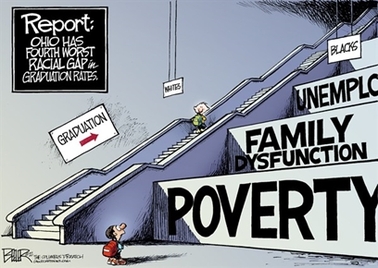 Unfortunately, the initial reason for segregation still exists as well. Take, for instance, the recent situation in Missouri. Normandy, a primarily black school district, lost its accreditation, and its students were going to be bussed to an 85% white district, Francis Howell. At a town hall meeting, Francis Howell parents expressed concern, with comments such as “We don’t want the different areas– I’m going to be very kind– coming across on our side of the bridge, bringing with it everything that we’re fighting today against”[4]. One parent said that Normandy had lost its accreditation because of violence (it did not) and argued that “ I shopped for a school district…I deserve to not have to worry about my children getting stabbed, or taking a drug, or getting robbed because that’s the issue”[5]. The parents’ remarks ranged from stereotypes to blatant racism, and it would be easy to mistake the meeting for one about bussing black kids to a white school in the 1950s.
Unfortunately, the initial reason for segregation still exists as well. Take, for instance, the recent situation in Missouri. Normandy, a primarily black school district, lost its accreditation, and its students were going to be bussed to an 85% white district, Francis Howell. At a town hall meeting, Francis Howell parents expressed concern, with comments such as “We don’t want the different areas– I’m going to be very kind– coming across on our side of the bridge, bringing with it everything that we’re fighting today against”[4]. One parent said that Normandy had lost its accreditation because of violence (it did not) and argued that “ I shopped for a school district…I deserve to not have to worry about my children getting stabbed, or taking a drug, or getting robbed because that’s the issue”[5]. The parents’ remarks ranged from stereotypes to blatant racism, and it would be easy to mistake the meeting for one about bussing black kids to a white school in the 1950s.
In his recent remarks in Flint, Michigan, President Obama noted that we have to lose the “us” and “them” mentality: “We’ve got to break that mindset that says that that neighborhood over there, that’s not my problem; those kids over there, they don’t look like my kids exactly, so I don’t have to worry about them…We’ve got to break that attitude that says somehow there’s an “us” and “them,” and remind ourselves that there’s just one big “we” — the American family, and everybody has got to look out for each other.”[6]
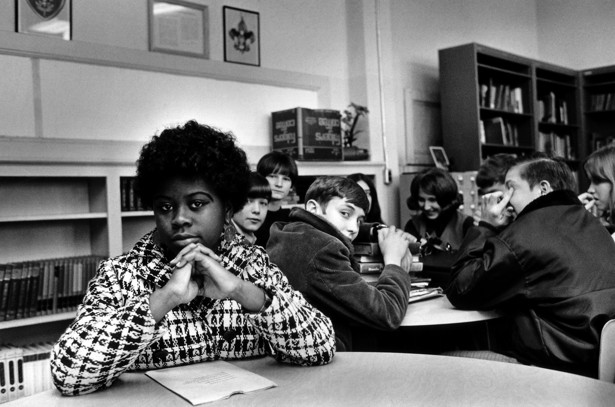
The idea of being one entity instead of several groups is important. When kids grow up in largely segregated neighborhoods and schools, they rarely get to see the world from any perspective other than their own. The world is not as small as it used to be, and it is essential that our kids know how to listen to other points of view from people who may have had different experiences and who hold different beliefs. A recent article in The Week supports the “Breakfast Club” effect, the idea that we benefit from spending time with people who are not exactly the same as us. The writer points out, “The explosion of the digital realm has given us an unprecedented capability to self-segregate, and surround ourselves exclusively by people who think and act like us. For now, high school remains pretty much the last time we are forced into a room with a mix of people that we have little control over.”[7] If our schools are segregated, there is little chance for the “Breakfast Club” effect to take place.
Integration is important for both academic and social development, yet our schools are more segregated than ever. How do we fix this? I don’t have the answers, and I don’t like not having answers, or at least suggestions. Outside of my time at Ohio State, I have never attended or taught at a school with much racial diversity, although there are great socio-economic disparities among my students. As a white, middle-class woman, I have not experienced the pain of being considered an “other”. But as a teacher, I know I am passionate about all students getting the quality education they deserve. As public education is at the very core of our democracy, educators must keep the conversation alive, must continue to discuss the importance of integration with our legislators, and must keep advocating for improvements to the system. I believe this is more of a moral issue than a political one, yet this might be a case where, as in the past, government has to step in.
There are many factors that can make a child’s path to education easier or harder, and many of those factors are out of our control. But once a student crosses the threshold of a school, whether in the nation’s cities, suburbs, or small towns, there should be no doubt that the best resources, facilities, and teachers are waiting to greet him.
[1] “Transcript: The Problem We All Live With – This American Life.” 2015. 10 May. 2016 <http://www.thisamericanlife.org/radio-archives/episode/562/transcript>
[2] “Brown v. Board of Education’s 60th Anniversary Stirs History, Reality …” 2014. 10 May. 2016 <http://www.usnews.com/news/articles/2014/05/16/brown-v-board-of-educations-60th-anniversary-stirs-history-reality>
[3] “Brown v. Board of Education’s 60th Anniversary Stirs History, Reality …” 2014. 10 May. 2016 <http://www.usnews.com/news/articles/2014/05/16/brown-v-board-of-educations-60th-anniversary-stirs-history-reality>
[4] “Transcript: The Problem We All Live With – This American Life.” 2015. 10 May. 2016 <http://www.thisamericanlife.org/radio-archives/episode/562/transcript>
[5] “Transcript: The Problem We All Live With – This American Life.” 2015. 10 May. 2016 <http://www.thisamericanlife.org/radio-archives/episode/562/transcript>
[6] “Read President Obama’s Speech in Flint on Water Crisis | TIME.” 2016. 10 May. 2016 <http://time.com/4318909/barack-obama-speech-flint-michigan-transcript/>
[7] “Why being miserable in high school is good for you – The Week.” 2015. 10 May. 2016 <http://theweek.com/articles/553540/why-being-miserable-high-school-good>
To All the Ones I’ve Taught Before
By Julie Rine, Minerva Local Education Association
Dear Former Students,
I know it’s coming: the day when I have your children in class. It will seem incredible to me, since I still picture you as teenagers. How can you be old enough to have a child of your own in high school?
In any case, I would like to apologize in advance. Things are different now.
 Remember when I brought in all the pairs of different shoes and you got to create the person who would wear them? Who would wear the old lawn-mowing tennis shoes? The ballet toe shoes with pink ribbons? The red five-inch heels? How old would that person be, and what idiosyncrasies would he/she have? What bad habits, what dreams, what regrets? And then you would pair up with someone after you had created your person and the two of you would write a scene in which your characters met each other and had a conversation. That was a fun way to teach you how to develop a character and punctuate dialogue. But it took a long time to accomplish all of that.
Remember when I brought in all the pairs of different shoes and you got to create the person who would wear them? Who would wear the old lawn-mowing tennis shoes? The ballet toe shoes with pink ribbons? The red five-inch heels? How old would that person be, and what idiosyncrasies would he/she have? What bad habits, what dreams, what regrets? And then you would pair up with someone after you had created your person and the two of you would write a scene in which your characters met each other and had a conversation. That was a fun way to teach you how to develop a character and punctuate dialogue. But it took a long time to accomplish all of that.

Remember the MHS Poets Society? You had several class days to just read and devour poems, to immerse yourself in the worlds of cummings, Frost, Angelou, Neruda. Then you got to write your own poems. Some of the best ones you wrote were based on the paint strips you were given; you had to incorporate those crazy paint color names into your poem. Some were easy, like “tranquil breeze” or “twilight”, but some of you ended up having to be really creative to work in “China Bear” and “Merino Wool”. One of my all-time favorite poems that one of you wrote for a Poets’ Society meeting started like this: “Some girls’ mothers/ Are fiercer than others.” I can still picture us, sitting in a circle on the floor with the lights out and a candle in the middle of our circle, passing around a flashlight as we read poems to each other. We never made it to a cave in the middle of the night like the kids in Dead Poets Society, but we laughed a lot and we even shared some tears when some of you wrote about your grandpa’s death or your parents’ divorce. But those meetings don’t happen anymore.
Remember the big stick figure posters of the characters in Romeo and Juliet? We loved adding pictures from magazines to symbolize aspects of their personality as we got to know them, and then we glued tombstones to their posters as they died. What fun we had coming up with epitaphs for them. One year Tybalt’s epitaph said “I lived by the sword, I died by the sword, without me in the play, you’ll probably be bored.” I still think of that every year when my classes read the Act III death scene. But there are no posters or witty tombstones anymore.
It’s not that those activities weren’t worthwhile. They certainly were, and they incorporated a myriad of the standards then and several of the common core standards now.
It’s just that I no longer have time for meaningful learning activities if they take more than a day. You see, the tests that your kids will have to take have much higher stakes, for them and for me. They need to earn certain scores in order to graduate, either on the AIR tests or the ACT, and I need them to do well on the tests to prove I’m not a horrible teacher.
Every year I say I’m not going to cave, I’m not going to “teach to the test”, which in English class means teaching the “formula” your kids must follow to score highly on the essay, among other skills such as how to answer certain types of multiple choice questions and how to use the technological tools available to them on the computer tests. Every year I tell myself I’m going to teach just like I used to, back when you were in my class and learning could be fun. If I did so, I am confident the standards would be addressed and your kids would turn out just fine. I mean, you turned out okay, right? And you probably even have some fun memories of learning in my class. The problem is that now, it isn’t about meeting the standards, it’s about passing the test.
I am afraid that if I don’t spend time teaching specific test-taking tips for the very high-stakes tests your kids must pass, their knowledge alone might not get them a passing grade. In fact, if they started writing in any sort of a creative way, or even worse, started developing their own voice, they would probably do very poorly on the essay part of the AIR test. The ODE sample essays that have been released are very formulaic. So we have spent weeks highlighting transitions, attributive tags, and other required elements in the sample essays, in our own essays, and in friends’ essays. It might be colorful, but it is definitely not fun.
Now, when we read poetry, we have to find the purpose of the poem, how the theme might connect to another piece of text, and what lines in the poem support that theme. We can’t simply read a poem for pleasure or to discover an author we like and can relate to. When we read Romeo and Juliet, we need to find specific lines to provide evidence that Tybalt is hot-headed, not find a picture of Tabasco sauce and glue it to his stick figure poster. And when we write our own poems or create our own characters….Well, frankly, we don’t really have time for that anymore. It’s not on the test.
So I apologize to you in advance. I promise to try somehow to squeeze in a little bit fun somewhere, but I want your kids to ace these tests, no matter how much I oppose them. I’ll keep working on making test prep more fun and more meaningful, but you should brace yourselves. When your kids come home and describe my class to you, it might sound like I’m an entirely different teacher. I’m not; it’s just an entirely different world than the one you grew up in, the one I wanted to teach in, and the one we made such good memories in. It’s a world where, more often than I like to admit, teaching the test trumps educating the soul. And for that, I am truly sorry.
The Power of Participation
By Julie Rine, Minerva Local Education Association
W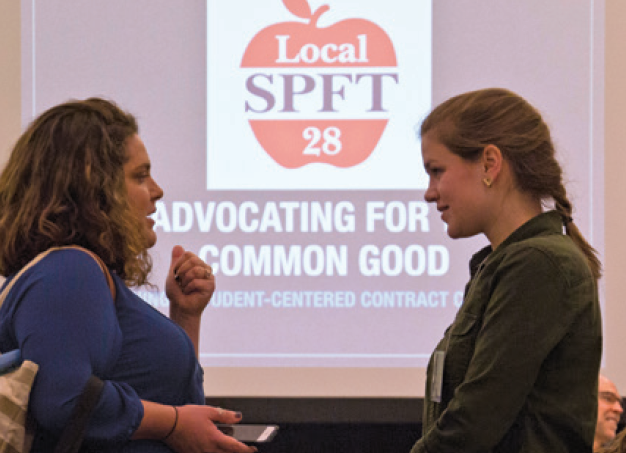 hen I started teaching 20 years ago, some colleagues taught me some very important tricks of the trade: how to get on the janitor’s good side, how to sweet talk the secretary into making last minute copies for me, how to drink cheap beer (on a young teacher’s salary, that might have been the most important lesson!).
hen I started teaching 20 years ago, some colleagues taught me some very important tricks of the trade: how to get on the janitor’s good side, how to sweet talk the secretary into making last minute copies for me, how to drink cheap beer (on a young teacher’s salary, that might have been the most important lesson!).
And then one of those friends invited me (dragged me) to a negotiations committee meeting. I was a member of the association, but really had no interest in getting involved, primarily because I had absolutely no idea what the union did or how it did it.
I remember he said being on the negotiations committee was a good place to start, because one of the most important jobs of the union was to represent the teachers at the table, to work with the administration of the district to make gains that would better serve the students and teachers of the district.
Looking back, I know that he was trying to get younger teachers involved in the work of the local association, as I do now. It’s important that the ideals and goals of the union pass down from one generation to the next and that we keep getting stronger each time the leadership changes. That colleague is retired now, but I think he would be proud of my involvement with the union that all began with one meeting where we brainstormed the needs we wanted to present to the administration at our contract negotiations that year.
Since then, I have served as Vice President and an at-large representative for our local association (we really need a more flattering title for that position!) and I have represented our association on various committees. I have helped screen local political candidates, attended regional events such as the legal update dinner and the annual meeting with state legislators, and last year I participated in the Representative Assembly in Columbus.
“We might be individuals with different beliefs, experiences, and priorities, but together we form a unit to be reckoned with, one that proudly uses its power and strength to advocate for Ohio’s kids.” — Julie Rine
I’ll admit that the first time I went to the ECOEA Legal Update dinner, it was because it is held at a local restaurant known for good Amish cooking and fantastic pies. I still go back every year, but not just because of the pie; it is truly interesting to hear what court cases and legal issues are affecting teachers in Ohio (and frankly, sometimes quite horrifying!).
This was the first year that I attended the dinner with legislators, but it will not be the last.
To actually have conversations with the men and women who have the power to make decisions that affect education in Ohio is an opportunity that cannot be taken for granted. The State School Board members who joined us that night seemed just as frustrated as we are at the recent actions of several members of the Board.
The legislators answered our questions as best as they could, and it was evident that many of them truly have a heart for education and a desire to stop the madness that public education in Ohio has had to endure under Kasich’s leadership.
Not every question we submitted was presented to the panel that night due to time constraints, but every single submitted question was sent to the panel members afterward. Those men and women now know exactly what issues evoke our anger and our passion, and they will be able to better represent us 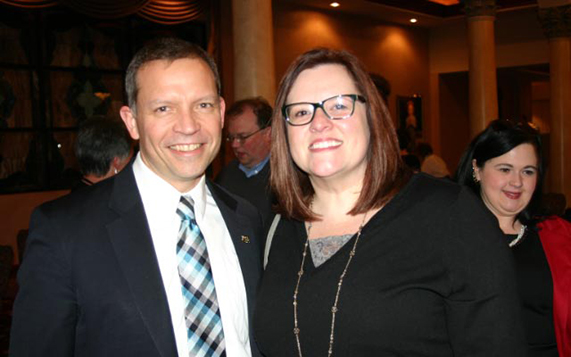 because of that three-hour event.
because of that three-hour event.
It was by default that I became our local association’s delegate to the Representative Assembly last year. Each spring, my local asks for people to indicate interest in serving on various committees or being our delegate to the RA. No one wanted to be the delegate. We have a very small budget for the delegates, and it’s actually possible to lose money by going to both fall and spring assemblies. I had no idea what to expect, but I and one other colleague agreed to go.
We held the election in the fall to make it official, but we were the only options. Because I was unable to attend the ECOEA RA prior to the one in Columbus, I did not get the delegate handbook until I arrived, but if I were to do this again, I would definitely get the handbook earlier; it explains what will be voted on, and gives many other details that would have kept me from going in blind.
At the assembly, I saw our union in action. There were the usual organizational tasks, budget reports, etc. (and I’ll confess this English teacher might have zoned out on the numbers, but I’m sure the math teacher delegates were paying attention!). What fascinated me most was the presenting of new business, new concerns and suggestions of issues on which the OEA should take an official position.
One of the issues that came up that year was whether or not there should only be one assembly per year, partly because of the financial strain two meetings can put on small districts like mine. On this issue and others, delegates from all over the state and from every local association could and did approach the microphones to make their opinions known, to make suggestions for language changes, and to offer compromises when the supporters of two opposing viewpoints seemed to be at complete odds with each other. The debates were respectful and orderly; a vote was held and the voices of our members were heard.
One way of getting involved in the union that I have not yet experienced is an annual OEA Lobby Day, and I look forward to participating in that at some point. First, though, I better practice a lot more yoga and deep breathing, because I have a feeling it would be a challenge to keep my temper in check if I ever met some of our current legislators.
If you are not involved in your local or district association, I urge you to consider being more active next year. Join a committee, or attend a yearly regional meeting of some sort (if you’re lucky, one with good pie!).
It might seem like just another meeting after school or just another annual event, but every time an association member is active in any way, our power grows. We might be individuals with different beliefs, experiences, and priorities, but together we form a unit to be reckoned with, one that proudly uses its power and strength to advocate for Ohio’s kids.
Categories
About Voices of ChangeCollective Bargaining
Education Support Professional
General
Higher Education Faculty
Higher Education Staff
Legislative Issues and Political Action
Local Leader
Member Stories
Membership
New Teacher
Non-educator
OEA Member
Organizing
preK-12 Teacher
Retired Member
Student Member
Union Business





